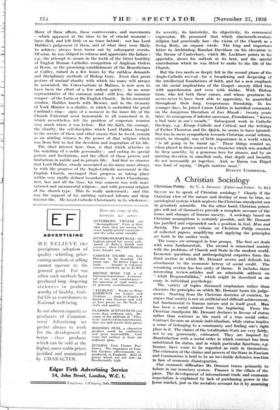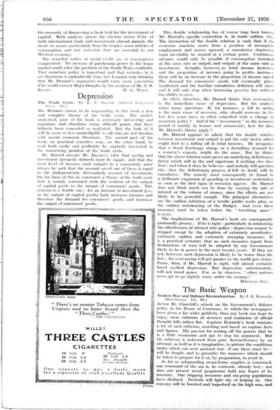A Christian Sociology
Christian Polity. By V. A. Dement. -(Faber and Faber. 7a. 6d.) OUGHT we to speak of Christian sociology ? Clearly if the Christian view of the nature and destiny of man be true, no sociological system which neglects the Christian, standpoint can be genuinely scientific. On the other hand, Christian princi- ples will not of themselves provide a complete account of the forms and changes of human society. A sociology based on Christian assumptions is certainly possible, and Mr. Demant has justified and expounded such a position in God, Man and Society. The present volume on Christian Polity consists of collected papers, amplifying and applying the principles set forth in the earlier work,
The essays are arranged in four groups. The first set deals with some fundamentals. The second is concerned mainly with the problems of Church and State in the modem world. Economic questions and anthropological enquiries form the third section in which Mr. Demant avows and defends his attachment to the economic heresy of social credit. The remaining section has less unity of theme. It includes three interesting review-articles and an admirable address on " Adult Responsibilities," which might be described as an essay in individual psychology.
The. variety of topics discussed emphasises rather than obscures the principles on which Mr. Demant bases his judge- ments. Starting from the Christian doctrine of creation, he argues that society is not an artificial and difficult achievement, but fundamental to human nature and in itself good. Man has been a social animal from the beginning: From the Christian standpoint Mr. Demant declares in favour of status rather than contract as the mark of a true social order_ Contract favours an atomic individualism, while status implies a sense of belonging to a community and finding one's right place in it. The claims of the totalitarian State are very fairly, not to say generously, estimated. They are inspired by dissatisfaction with a social order in which contract has been substituted for status, and in which particular. fieinctions, e.g. finance, have come to be regarded as ends in themselves. The extension of the claims and powers of the State in Fascism and Communism is held to be an inevitable defensive reaction in face of economic disintegration.
Our economic difficulties Mr. Demant traces primarily to failure in our monetary system. Finance is the villain of the piece. The development of international trade and economic imperialism is explained by lack of purchasing power in the Dome market, just as the socialists account for it by assuming
the necessity •of discovering a fresh field for the investment of capital. Both analyses ignore the obvious raison d'etre of both international trade and investment abroad, namely, the desire to secure, particularly from the tropics, some articles of consumption and raw materials that- arc essential to our Western economy.
The remedial values of social credit are in consequence exaggerated. No increase of purchasing power in the home market could solve the problem of the South Wales coalfields. That monetary policy is important and that mistakes in it .are disastrous is undoubtedly- true, but I cannot help thinking that Mr. Dement's arguments would 'carry more conviction if he would correct Major Douglas by the analysis of Mr. J. M.















































 Previous page
Previous page